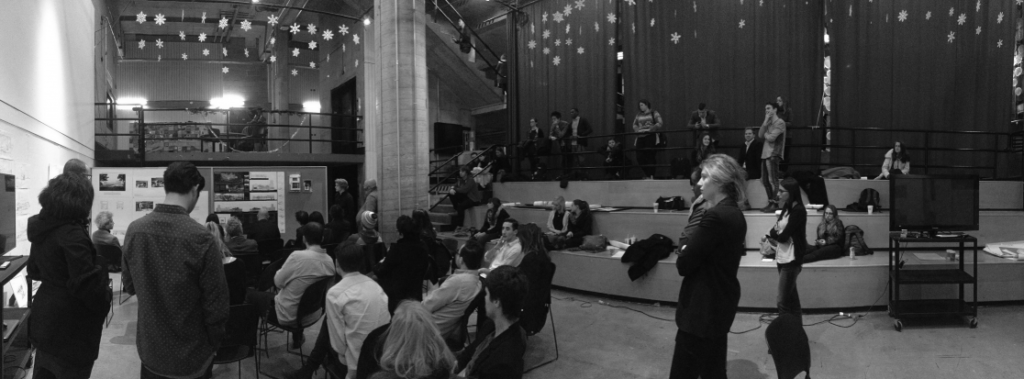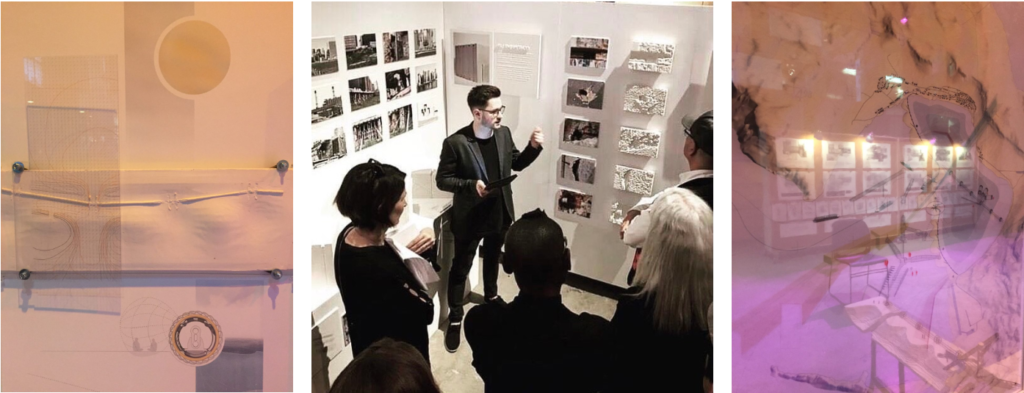As students return to in-person thesis reviews, alumni share work for inspiration
November 8, 2022
Master’s students at the Azrieli School of Architecture & Urbanism have one major assignment in their final year — to produce a thesis project through design and writing.
For many thesis students, who have spent the past one to two years learning online, the return to in-person thesis reviews and discussions is a new experience. They are now gearing up for Colloquium 2 on December 8 and 9, when all 45 students will present in-progress work at the Architecture Building.

To build excitement and set ambitions, the school will show examples of pre-lockdown thesis work by alumni — along with their words of advice — on Instagram and Facebook over the next four weeks.
Watch for the visuals and texts here:
Instagram: @carleton_architecture
Facebook: @azrielischoolofarchitectureurbanism

The Subtle Landscape: An Architecture of 3 Days
R – Marie Lefebvre (MArch ’18)
The Illuminated City: An Atlas of Islamic Space in Montreal
The materials generously shared by recent alumni will indicate the wide range of forms and topics a thesis might explore.
“There is no formula for an architecture thesis, and each path is distinct,” says Associate Professor Lisa Moffitt, chair of the MArch program.
“It is an opportunity for students to engage in depth with a disciplinary topic of interest through reading, writing, and making,” she says. “It is also important to note that the thesis year is a process and that the colloquia establish benchmarks for celebrating and supporting work-in-progress.”
There are currently 19 full-time faculty acting as thesis supervisors.

LIFE ON THE EDGE: The Archeologist, the Oil Rig, and the Newfoundlander
Quick Facts
[insert description list here]
What is an architecture master’s thesis?
A thesis is a thing — a bound document submitted at the end of the academic year, a culmination of a body of work. It is also a process of testing ideas, refining them, iterating, and testing again to come to a position about a specific concern within the field of architecture. The thesis culminates Carleton’s MArch degree and takes place over a full academic year.
How is it different from a studio project?
In studios, students are given project briefs or syllabi that define the aims, outputs, methods of working, sites, program, deadlines, and indicative bibliographies. This framework structures the development of a design project. In the thesis, students define many of these parameters, developing their project and position and defining their methods.
What happens at a colloquium?
Students prepare in advance by curating their work in a designated review space. During the colloquium, students present their thesis projects/questions/positions to fellow students, faculty, and internal or external guest critics. They receive supportive feedback on how to best propel their work forward through the next semester.
How is a colloquium different from a studio review?
Colloquia are structured much like conventional studio reviews; students are organized by thesis supervisor groups. What makes the colloquia distinct from studio reviews is the diversity of topics, approaches, themes, and methods presented by the students. This is because thesis students develop their own frameworks for thinking and working, unlike design studios in which instructors produce a project brief that establishes a framework for the students.

Toxic Landscapes and Technofossils: A Speculative Anthology of Flin Flon, Manitoba
C – Troy Whelan (MArch ’18)
Landscape and Seascape Instruments: Artic Bay at the Intersection of Ecology, Economy and Infrastructure Development
Key Dates/Milestones
Colloquium 1: October 17 and 18
Students present their preliminary thesis project, ideas, and questions to a group of internal critics. Critics provide feedback, pose questions, and assess the thesis question/trajectory and the links to date between design/research work and the thesis proposition.
Colloquium 2: December 8 and 9
Students present a well-developed thesis project and the thesis position or argument to a group of external critics. These critics provide overall feedback, pose additional questions, and assess what the project has achieved. They may also suggest ways in which the project can be further investigated.
Colloquium 2 Reflective Document: December 18
Students submit a C2 Reflective document. It should detail a thesis position and an approach to design research as evidenced through drawings, photographs, images, and writing and the methods and approaches guiding the work.
Colloquium 3: February 13 and 14
Students present their thesis project and argument to a group of internal (and sometimes external) critics invited by faculty supervisors. Feedback will offer direction on final decisions for the completion of the work for the thesis defense.
For each of the three colloquia, students are assigned a half-hour slot. This includes a short presentation (8-10 minutes) with the remainder of the time for feedback from the panel of critics.
Thesis Book Exam Copy Submission: March 27 (to be confirmed)
This substantially completed document is required to schedule a defense.
Thesis Defense: April 20 and 21 (to be confirmed)
Panels of internal and external critics discuss the student’s work in an open forum. Following the presentation, the formal defense committee assesses the thesis in a closed session.
Thesis Book Final Submission: May 5 (to be confirmed)

Landscape and Seascape Instruments: Artic Bay at the Intersection of Ecology, Economy and Infrastructure Development
C – Carl Boucher (MArch ’19) defends his thesis, in the Pit: Doing Nothing in New York City: A Case for Terrain Vague in Manhattan
R – Troy Whelan (MArch ’18)
Landscape and Seascape Instruments: Artic Bay at the Intersection of Ecology, Economy and Infrastructure Development